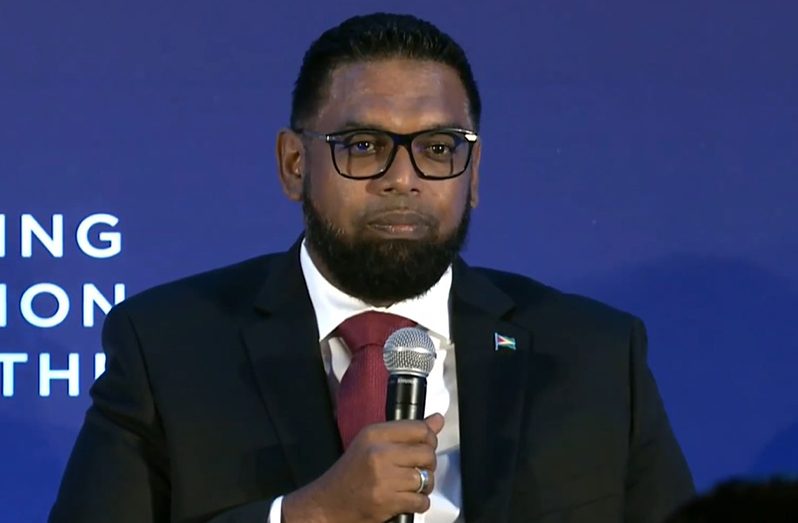financing remains a major hurdle, President Ali says
By Cassandra Khan
PRESIDENT Dr. Irfaan Ali has identified financing as the foremost challenge in the transition towards a globally efficient world that is focused on renewable energy.
The Head of State was, at the time, responding to a question during the Clinton Global Initiative 2023 meeting.
He said: “The biggest challenge definitely would be financing. We’re not short of ideas. There’s growing technology, but the challenge is financing.”
President Ali also raised a more complex issue as it relates to what constitutes a just transition and what should be the outcome of the UN Framework Convention on Climate Change (COP28) in relation to renewable energy.
He said that he believes strongly that a constructive approach needs to be taken if this issue is to be addressed.
“We perhaps are in a position to speak on both sides of the coin because we are a leader on climate change and we are a leader now in energy,” he said.
The President later highlighted five things that need to be part of the wider conversation.
According to him, these are: the role of petroleum producers, the companies and the countries around the renewable energy table, how do we ensure that there is greater budget support for research and development and a greater support for technology and bringing that new technology into the equation.
He added that, as a newcomer to the petroleum industry, Guyana is proposing and supporting a carbon tax and the removal of subsidies on petroleum producers.
“So those are the things that we’re taking to COP and I think this balanced approach is critical. If we don’t pursue a balanced approach, then we’re not going to constructively tackle this problem,” he said.
Later, while responding to a question about what would be the greatest accelerator for Guyana to attain its goal of being a completely renewable energy economy, President Ali said that collective action is required.
“Just to pick up from the issue of culture, and sustainable development, we have to first put things into context and I don’t want to divorce Guyana from the rest of the region here because this requires collective action,” he said.
President Ali added: “The prosperity of Guyana must lead to the prosperity of the region. You have a situation where in Latin America and the Caribbean we need $2.2 billion to achieve four important SDGs (Sustainable Development Goals), you have debt to GDP ratio of 117 per cent.”
DIFFERENT CONVERSATIONS
He explained that with the existing double digit inflation figures, resources are needed in order to move towards a renewable transition and net zero.
According to President Ali, the issue is that the conversation surrounding net zero has suddenly changed.
“The conversation was stopping petroleum. We will remove the balance from this conversation if every NGO, every actor has now shifted the goalposts from achieving net zero to stop in petroleum.”
Scanning the news earlier, he said it was all about the “dead stop to petroleum,” and not the transition to net zero.
To this end, he said the conversation on the transition to net zero is far different from stopping petroleum.
Additionally, he asked about the plans to ensure that in the transition, there is just reward for those countries who are keeping their environment and their forests and ensuring that their forests contribute to the climate equation.
“I think that Guyana… where we are going to achieve the 100 per cent renewable is not only for us, we want to create an energy hub, a regional energy hub, in which we are a net exporter of energy, most of which must come renewable,” he noted.
He related that 35 to 40 per cent of the world is still having their energy source from coal which he identified as the first target that needs to be eliminated.
Speaking on his approach to the hyper politicisation of renewable energy and all the roadblocks faced in politics, he said it all comes back to the question of the balanced approach.
“If we want to have a frank and constructive conversation, you have to have everyone in the room and the President just pointed to the fact that we have technology that can cut emission by 25 per cent. The cost to get to where we want to be in 2030 is simply prohibitive; the money is not there,” he said.
He related that they have to get those in the coal and petroleum sectors to make some commitments along the line of research and development technology, the carbon tax and also look at the removal of subsidy.
“So we need them in the room,” he said.



.jpg)








